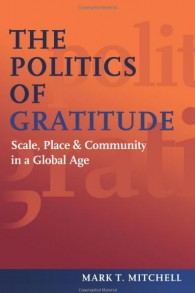Gratitude – Is it possible for modern people to be grateful?

No, not impossible, but it may be rather difficult! Some eighty years ago, the Spanish philosopher Jose Ortega y Gasset pointed out that we moderns exhibit a “radical ingratitude” toward all that has “made possible the ease of our existence.”
[Moderns] are only concerned with their well-being, and at the same time they remain alien to the cause of that well-being. As they do not see, behind the benefits of civilization, marvels of invention and construction which can only be maintained by great effort and foresight, they imagine that their role is limited to demanding these benefits peremptorily, as if they were natural rights.
Modern people, Gasset concluded, exhibit the psychological characteristics of “the spoilt child.” Although he doesn’t use the same descriptive language, political philosopher Mark Mitchell agrees. In an insightful article titled “Ingratitude and the Death of Freedom,” he briefly examines four cultural shifts that have left moderns characteristically ungrateful.
· First is the loss of God along with an acknowledgment of a moral law that exists prior to human will.
· Second, we have lost contact with the natural world.
· Third, we have too often lost a sense of place.
· Finally, we have experienced a loss of the past.
Mitchell turns to the biblical doctrine of stewardship for the much-needed corrective to this contemporary “spoilt child” mentality.
Gratitude, properly conceived, gives birth to ongoing acts of stewardship. From God we have been given life. We have knowledge of the moral law that provides the basis of order for human relations. Gratitude leads to respect for the dignity of human life and a willingness to live within the limits imposed by the moral law. The natural world provides us with that which sustains our physical existence. We should care for it with wisdom and gentleness. We have inherited from our collective parents a way of life in a particular place, a way of organizing ourselves politically and socially, a way of governing ourselves. These goods, practices, and institutions cannot survive much less thrive if they are treated casually or neglected. They require careful tending, constant nourishment, and loving care.
In the family of virtues, gratitude is the child of humility, Mitchell argues. Any culture that isn’t built in the lineage of these virtues will inevitably decline into lawlessness.
Gratitude is a way of inhabiting the world. It is a disposition toward the world that reminds us that we are not alone. We are not solitary creatures owing nothing to no one. Rather, gratitude points to our dependence. It is a fitting attitude in the face of our creatureliness. When our thoughts are characterized by gratitude, they are outward looking. Gratitude breaks us out of the cocoon of self-satisfaction and self-concern that is a constant temptation and impels us to think of the ways our lives are related to others….
Gratitude, ultimately, is born of humility, for it acknowledges that both the creation and our civilization are gifts. This recognition gives birth to acts marked by attention and responsibility. Ingratitude, on the other hand, is marked by hubris, which denies the gift, and this always leads to inattention, irresponsibility, and abuse. In political terms, the hubris of ingratitude is a caustic acid that reduces all in its wake to the fetid condition of servitude, for a spoiled child needs nothing so much as a master.
Thus, if gratitude is the mother of stewardship, ingratitude strips away the ground for an adequate account of stewardship and leaves nothing behind but a narrow concern for the self. Forgotten is our collective debt to God, the natural world, to a place, and to the past, all of which are necessary for an adequate understanding of our debts to both the past and the future. When duties are neglected, all that remains is the pursuit of pleasure or power. Neither pursuit sustains freedom. In fact, as these become increasingly the focus of our individual and corporate lives, freedom is correspondingly diminished. Freedom, to be durable, must exist within the context of responsibilities that limit freedom, yet in the process heighten its meaning by orienting it according to ideals of self-sacrifice, love of community, and care for others.
If freedom produces conditions that induce ingratitude, and ingratitude represents a threat to freedom, then it seems we have reached the ironic position where we extol the virtues of freedom yet discover that the very thing we champion is a danger to itself. What can be done? Clearly we must attempt to cultivate the disposition of gratitude. This will give birth to acts of stewardship, which are necessary to sustain an orderly and mature freedom. Unconstrained by stewardship and gratitude, freedom will invariably descend into license, and license will eventually decline into lawlessness. In such an atmosphere, tyranny is nurtured even as freedom suffocates and eventually dies.
“Ingratitude and the Death of Freedom” is available (here) on the website of the Front Porch Republic.It is also included in the newly released book, New Threats to Freedom, edited by Adam Bellow and published by Templeton Press.
Mark T. Mitchell teaches political theory at Patrick Henry College in Purcellville, VA. He is the author The Politics of Gratitude: Scale, Place, and Community in a Global Age. He is co-editor of The Humane Vision of Wendell Berry. Along with Jeremy Beer, he co-founded Front Porch Republic in early 2009.


 December 2, 2013
December 2, 2013 







Comments are closed.